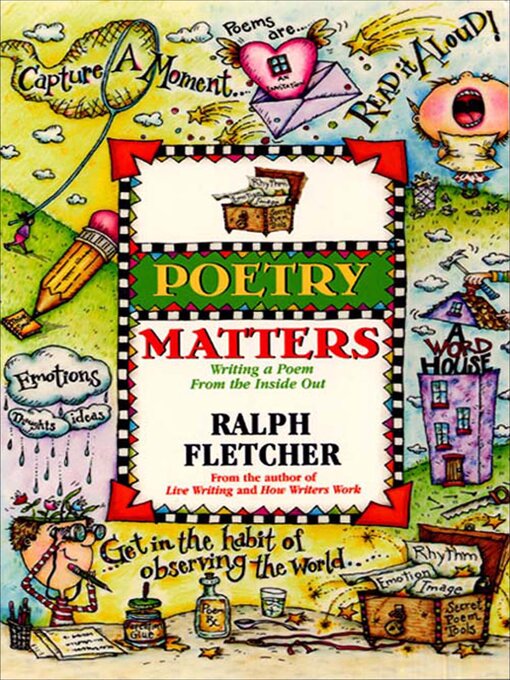- Audiobooks for the Whole Family
- What's new?
- Popular titles
- Spanish Language Read-Alongs
- Check these out!
- See all audiobooks collections
Poetry matters. At the most important moments, when everyone else is silent, poetry rises to speak.
From the bestselling author of A Writer's Notebook and the ALA Notable Book Fig Pudding, this book is full of practical wisdom to help young writers craft poetry that shines, sings, and soars. It features writing tips and tricks, interviews with published poets for children, and plenty of examples of poetry by published writers—and even young people themselves.
Perfect for classrooms, this lighthearted, appealing manual is a celebration of poetry that is a joy to read. Young poets and aspiring poets of all ages will enjoy these tips on how to simplify the process of writing poetry and find their own unique voice.
"Peppered with interviews with published poets, [this] accessible volume teaches kids to write poetry from the heart." —Publishers Weekly
"Packs in a wealth of information without a word of jargon. It's also an introduction to the fun of reading poetry." —Booklist
-
Creators
-
Publisher
-
Release date
September 22, 2023 -
Formats
-
Kindle Book
-
OverDrive Read
- ISBN: 9780062014924
-
EPUB ebook
- ISBN: 9780062014924
- File size: 1991 KB
-
-
Languages
- English
-
Levels
- Text Difficulty: 4-6
-
Reviews
-
Publisher's Weekly
March 1, 2002
Throw out the formidable rhythm and rhyme schemes: Ralph Fletcher's Poetry Matters: Writing a Poem from the Inside Out laughs in the face of formality. Organized into two sections "Lighting the Spark" and "Nurturing the Flame" and peppered with interviews with published poets, Fletcher's accessible volume teaches kids to write poetry from the heart. -
School Library Journal
February 1, 2002
Gr 5-9-A concise, nuts-and-bolts guide to creating poetry. The book begins by defining poems as "emotional X-rays" that seek to delve into a person's inner being. Chapters deal with images; creating "music," or sounds and rhythms; how to generate ideas for poems; the construction of the words on the page; and more. Tips on fine-tuning are also given, from experimenting with wordplay to finding a voice and narrowing the focus of a piece. Major poetic forms are defined, including haiku, ode, and free verse, and there is a section on ways to share your work. Interspersed are Fletcher's personal insights and interviews with three poets-Kristine O'Connell George, Janet S. Wong, and J. Patrick Lewis-who discuss what inspires them and how they go about creating their work. The many examples of poetry throughout embody the author's advice by showing how writing techniques actually function in poems. Since this thought-provoking book covers more of the internal, less-tangible aspects of poetry, it may be more suited for readers who have some experience with the genre.-Kristen Oravec, Cuyahoga County Public Library, Strongsville, OHCopyright 2001 School Library Journal, LLC Used with permission.
-
Booklist
May 15, 2002
Gr. 4-7. Chatty, but never condescending, and encouraging about how to get started and how to keep going, this informal paperback guide packs in a wealth of information without a word of jargon. It's also an introduction to the fun of reading poetry. In short chapters Fletcher talks about feelings, images, music, and wordplay, and he explains what these are with lots of immediate quotes to turn kids on. He warns against message, against the "fake sentiment in a greeting card," and against pushing for rhyme, and he encourages young poets to find a personal voice. There's a brief chapter about form (haiku, free verse, etc.), but Fletcher's emphasis is on crafting the poem to describe something "as if we're seeing it for the first time." Brief, accessible interviews with three children's poets reinforce this view of the joy and hard work of creation. There's a lengthy annotated bibliography, and the cheerful, open, paperback format makes the book an excellent choice for classrooms and writing groups as well as individuals.(Reprinted with permission of Booklist, copyright 2002, American Library Association.) -
The Horn Book
July 1, 2002
This guide begins with the "three pillars of poetry," which Fletcher states are emotion, image, and music. The twelve chapters include an exploration of those elements, ways to refine poems, tips on presenting them publicly, and interviews with poets Kristine OConnell George, Janet S. Wong, and J. Patrick Lewis. Samples of verse throughout illustrate Fletchers points in a concrete, understandable way. Bib.(Copyright 2002 by The Horn Book, Incorporated, Boston. All rights reserved.)
-
Formats
- Kindle Book
- OverDrive Read
- EPUB ebook
subjects
Languages
- English
Levels
- Text Difficulty:4-6
Loading
Why is availability limited?
×Availability can change throughout the month based on the library's budget. You can still place a hold on the title, and your hold will be automatically filled as soon as the title is available again.
The Kindle Book format for this title is not supported on:
×Read-along ebook
×The OverDrive Read format of this ebook has professional narration that plays while you read in your browser. Learn more here.




